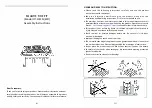
UK/IRL
21
UK/IRL
20
UK/IRL
3. Connect the wires to the gas valve (see fig. 15).
4. Check that there are batteries in the transmitter. See "Replacing
batteries".
5. Set the on/off switch on the receiver to "on".
Setting the right transmission code
The receiver has to learn the code from the transmitter, which is
already set at the factory. However the code disappears if the
receiver is disconnected from the mains for a longer period.
1.
Push the "mod" button on the receiver and hold it for 3 seconds.
2. The green control lamp will light up and stay on. Repeat this step
if not.
3. Push a button on the remote control. The control lamp on the
receiver should now go out.
4. Again push a button on the remote control. The lamp starts
flashing and will switch off eventually.
5. The receiver now recognizes the remote control. The remote
control now functions.
6. Check if you can hear a sound and the motor runs when you
push a button on the remote control.
fig. 15
UK/IRL
6. COMMISSIONING
(functional checks)
6.1. Check pilot ignition
1.
Push in and turn the control knob (A) anticlockwise to the
setting
(small flame). You will hear a tick meaning there is
ignition. Hold the knob in and wait for a few seconds while the
air is purged.
2. Bring the knob back in the start position and turn the knob
several times to the
position. Check that the pilot has lit.
3. Continue to hold in the control knob for a further ten seconds to
ensure that the pilot flame is stable.
4. Release the knob. The pilot should remain alight.
6.2 Functional burner check
1.
Turn knob (B) to max. clockwise.
2. Turn the knob (A) more anticlockwise to the
position (large
flame). Now it is possible to light the main burner.
3. Turn knob B anticlockwise to max. The main burner should light.
4. Check the ignition of the main burner on low and high setting.
5. Turn knob B clockwise till
{
. The main burner is off.
6. Turn the knob A to
{
. The pilot should go out.
A
B
fig. 16













































